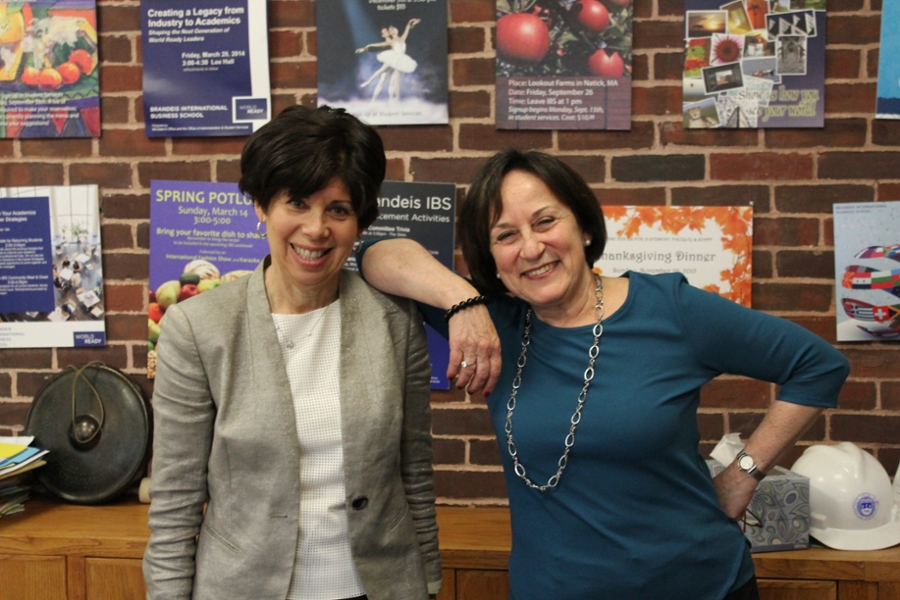
It is rare for a student to leave Brandeis International Business School without having interacted with Kate Goldfield or Viola Morse. Even rarer is the student who wasn’t impacted by these powerful women. Goldfield, associate dean for Administration and Student Services and Morse, director of Administration and Student Services, devote their time to ensuring that students feel confident, comfortable and acknowledged in the fast-paced graduate school environment and to providing the warmth students need to feel at home. We sat down with them to learn what it takes to be #WorldReadyWomen
VM: I always wanted to be a teacher. My major in college was education. I thoroughly enjoyed connecting with students but was also drawn to the nonprofit world. I wound up going back for my MBA when I realized that meshing nonprofit experience with hard business skills would benefit my career. I worked in healthcare for some time but left as the personal touch and customer care aspects fell away. That’s when I transitioned into higher education, where I could go back to connecting with students in the way I had always enjoyed.
KG: I started out teaching high school and wanted to work with adolescents in a positive way developmentally. I decided to pursue an additional degree in counseling and psychology, and from there, I landed a position at Boston University where I was director of student services at the College of Communication. In 2003, I joined the team at Brandeis. On the side, I work at a private practice with many adolescents who are incredibly bright but need additional resources to get where they want to go.
VM: I love working with younger women who teach me new things every day. You can get tunnel vision if you stay within your own cohort, and when that happens, your opinion becomes less valid. Having that multi-generational experience gives me a healthy perspective.
KG: It’s talking with students when they’re sitting outside my office or walking through the cluster and checking in on how they’re doing. It’s the informal sound bites that turn into longer conversations that not only provide a great connection but allow me to take the temperature of our community.
VM: Edith Phelps was a headmistress of the Dana Hall School, and she was also president of the Girls Clubs of America. She grew to prominence in the ’60s and struggled as a lone voice in a world of men. She was a tough old bird but an incredibly smart and dynamic woman. I admired her tremendously. She helped me with my self-confidence and made me see that despite forces working against you, you have to figure out how to work with people.
KG: There’s a saying from Eleanor Roosevelt that has stuck with me for some time: “You must do the thing you think you cannot do.” I’ve had doubts and insecurities throughout my career, and there were times when I felt I really needed to nail it because of who my audience was. As time has gone on, I’ve been able to access more of my own trust when going into a situation, regardless of who is sitting around the table. The good news, I think, is that the occupants of those tables have shifted. The representation and diversity makes me feel more hopeful. Our female students’ level of participation and integration within our community and their sense of self is refreshing and at times bold in a very positive way. It’s nice to see that this is the norm now, not the exception.
VM: The strongest students aren’t always those with the highest grades. Rather, they’re the ones who are willing to push boundaries and get out of their comfort zone. They’re the ones, in my mind, who can really get ahead and make an impact. I remind students that the more connections they make, the more they’ll find themselves in the right places for new opportunities.
KG: Listen to what people have to say. Grow a team that appreciates when you’re at the table but can manage quite successfully when you’re not. As a leader, you have to lay the groundwork for mutual trust, respect and autonomy, and to reinforce people’s development in areas where they shine. The bottom line is that I love my job. That’s what people are supposed to say, but I don’t think I’d be able to fake it in this role. It feels hugely gratifying to be able to walk into your place of work each day and be excited to be there.
Featured Stories
News Categories
@BrandeisBusiness Instagram
View this profile on InstagramBrandeis Intl. Business School (@brandeisbusiness) • Instagram photos and videos

November 30, 2016
FEI, International Business School partner to enhance career preparation